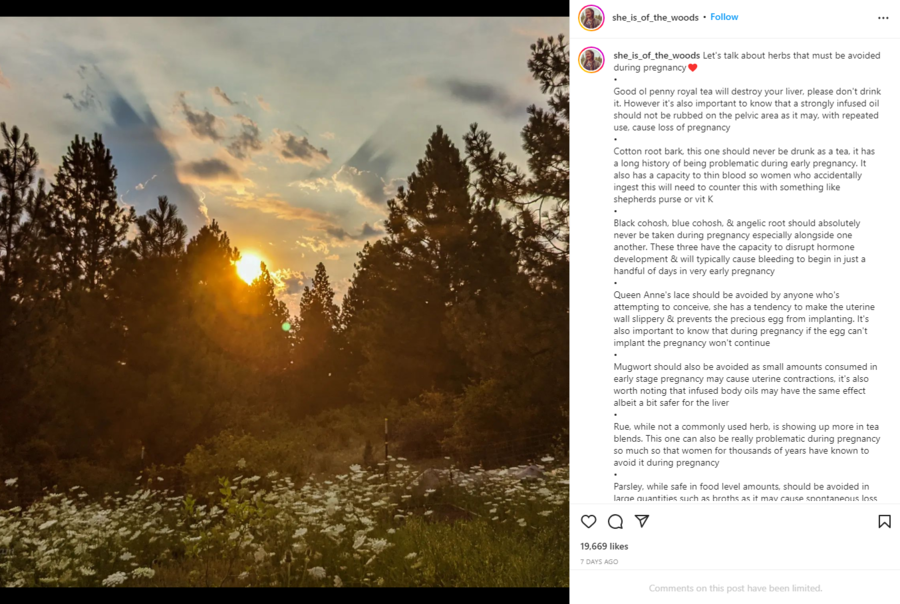STORY UPDATED: check for updates below.

Should people who are pregnant take herbs such as pennyroyal, black cohosh, blue cohosh and parsley in order to miscarry? No, that's not true: While there are studies that suggest some herbs can cause complications during pregnancy, many health organizations assert that they are less effective, ineffective or dangerous if trying to end a pregnancy. In the United States, approved abortion pills are the only safe and effective way to self-manage an abortion. Asking a doctor about taking any herbs or supplements during pregnancy is recommended.
The claim was implied in an Instagram post published on June 24, 2022. The caption opens:
Let's talk about herbs that must be avoided during pregnancy❤️
The caption lists various herbs that can be harmful to a pregnant person and their pregnancy. Pennyroyal, cotton root bark, black and blue cohosh, angelic root, Queen Anne's lace, mugwort, rue and parsley are described as "just a handful of herbs that may disrupt hormones, cause uterine contractions, & that should be avoided by anyone wanting to keep a pregnancy viable." It ends by hinting that those who want to terminate a pregnancy should do so via the listed herbs:
Keep learning about these & other herbs you may have access to that cause these situations
•
I mean how else will we avoid accidental miscarriages?
•
You're smart enough to do this too😉
This is how the post looked on Instagram at the time of writing:
(Source: Instagram screenshot taken on Fri Jul 1 17:57:56 2022 UTC)
The American Pregnancy Association materials about herbs and pregnancy acknowledge that any advice regarding whether to ingest certain herbs while pregnant should come from the pregnant person's doctor or an experienced herbalist. There is limited evidence to support safety claims about herbs during pregnancy. The materials explore the variety of safety ratings used by researchers and herbalists when referring to herbs taken during pregnancy:
One key thing when understanding the safety ratings is to pay attention to what type of use the rating is for. For example, the rating for rosemary is considered Likely Safe when used orally in amounts typically found in foods. (Rosemary has a Generally Recognized as Safe (GRAS) status in the US.)
But in pregnancy, rosemary is considered Possibly Unsafe when used orally in medicinal amounts. Because rosemary may have uterine and menstrual flow stimulant effects, it is best to avoid using it. There is insufficient reliable information available about the safety of the topical use of rosemary during pregnancy. This is a prime example of how the method of use of the herb changes its safety rating.
Still, the APA web page tries to provide a list of herbs that are "Likely Unsafe or Unsafe during pregnancy" based on a database from Natural Medicines: black and blue cohosh (when used orally) and pennyroyal (when used orally and topically) are among the list.
In an email to Lead Stories sent on July 15, 2022, Alicia Calvillo, senior content manager of Natural Medicines, told us:
We recently wrote an article on this topic, due to the concerning increase in these claims online. A number of herbs and plants have historical use as abortifacients (substances utilized to induce abortion). However, these traditional uses have rarely been validated by scientific research, so they are unlikely to be a reliable method of abortion. Additionally, some of the plants recommended for this purpose (such as pennyroyal and blue cohosh) are unsafe for the parent, even in small doses. Many of the other recommended plants can cause serious adverse effects when taken in large quantities.
In an email sent to Lead Stories on June 28, 2022, Megan Freeland, director of health communications at Planned Parenthood Federation of America said herbal treatments are "less effective or ineffective" in trying to induce an abortion. Freeland, who has a doctor of pharmacy degree, wrote:
To be clear, the spectrum of approaches people have used to try to induce an abortion ranges from the less effective or ineffective (herbal treatments) to the unsafe (chemicals or incorrect medications) to the dangerous (physical harm). The most effective, well-studied regimen for medication abortion in the U.S. is mifepristone and misoprostol. Research shows that self-managing an abortion with abortion pills (mifepristone and/or misoprostol) can be safe and effective.
In an email to Lead Stories sent on July 1, 2022, a spokesperson for the American College of Obstetricians and Gynecologists (ACOG) attached a statement from Dr. Nisha Verma, a Darney-Landy Fellow at ACOG. Verma warned that misinformation about self-managing abortions can be misleading and cause people to turn to "unsafe abortion methods":
People have been self-managing their abortions for decades with the support of community organizations and medical experts. We have seen that people can safely self-manage their abortions with medications like misoprostol. However, some people may also turn to unsafe abortion methods when they feel they have no other option or based on information they are gathering on social media. It is important for people to understand that social media posts can be unreliable and can sometimes propagate misinformation. Misinformation can be harmful because it may lead people to try to end their pregnancies in an unsafe way, potentially exposing them to serious bodily harm. While people can self-manage their abortions in a safe way, spreading misinformation about unsafe methods of abortion is incredibly dangerous.
The Food and Drug Administration (FDA) emailed Lead Stories on July 8, 2022, about the claim:
FDA has determined that Mifeprex and the FDA-approved generic are safe and effective for the medical termination of early pregnancy. FDA has not approved any other drug product for this indication.
Lead Stories also reached out to the American Herbalists Guild. We will update this story, as appropriate, when it responds.
Updates:
-
2022-07-18T23:20:26Z 2022-07-18T23:20:26Z Added July 15, 2022, response from Natural Medicines. -
2022-07-08T17:32:26Z 2022-07-08T17:32:26Z Added July 8, 2022, response from FDA.


















